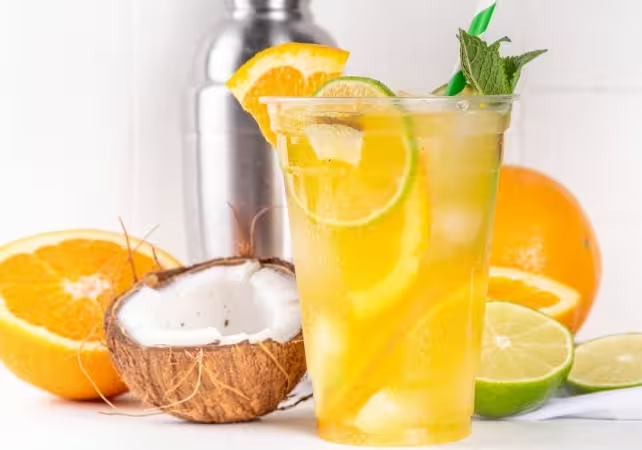6 Minutes
What is a "cortisol cocktail" and why is it trending?
“Cortisol cocktails” are viral wellness drinks promoted on social media as quick fixes for stress and so‑called "adrenal fatigue." Typical home recipes mix orange juice and coconut water with a pinch of salt and sometimes magnesium or potassium powders. Proponents claim the blend lowers high cortisol, restores adrenal function and improves energy and resilience. But do these assertions hold up against current endocrinology and stress‑physiology knowledge?
How cortisol works in the body
Cortisol is a steroid hormone produced by the adrenal glands and tightly controlled by the brain through the hypothalamic‑pituitary‑adrenal (HPA) axis. Commonly labelled the "stress hormone," cortisol does more than respond to acute threats: it supports glucose metabolism, modulates inflammation, influences cardiovascular function and follows a robust circadian rhythm. Levels rise before waking, peak in the morning to mobilize energy for the day, fall during the afternoon and remain low overnight to permit restorative sleep.
Because cortisol has varied roles, the relationship between cortisol and symptoms such as fatigue or weight change is complex. Chronic stress can produce sustained elevations in cortisol for some people, but prolonged or maladaptive stress responses may also lead to relatively low cortisol output. "Adrenal fatigue" as an unspecific diagnosis is not accepted by mainstream medicine; true reduced cortisol production is a feature of adrenal insufficiency or other recognised endocrine disorders that require medical testing and treatment.

Ingredients, claimed mechanisms and the science
Typical cortisol cocktail ingredients and the rationale behind them include:
- Vitamin C (from orange juice): an essential nutrient that supports general adrenal gland health and antioxidant defenses; some observational and experimental data link adequate vitamin C with healthier stress responses.
- Potassium (from coconut water or cream of tartar): important for cellular function and blood pressure regulation; potassium does not directly lower cortisol but can influence cardiovascular symptoms associated with stress.
- Magnesium (added as a powder by some recipes): involved in cellular energy metabolism and nervous system regulation; magnesium depletion may worsen stress reactivity for some people.
- Sodium (a pinch of salt): sometimes promoted as supportive for "adrenals," but excess salt is associated with higher blood pressure and can raise cortisol in animal and human studies.
Orange juice and coconut water go into a cortisol cocktail. (rimmabondarenko/Canva)
While these nutrients are biologically important, there is no robust evidence that a single beverage meaningfully changes basal cortisol set points in healthy adults. Short‑term nutrients can modify aspects of physiology—hydration, electrolytes and transient blood glucose—but claims that the drink resolves both "high cortisol" and "adrenal fatigue" are contradictory and medically implausible.
Risks: sugar, salt and clinical interactions
Even modest recipes can be high in free sugars. A half‑cup of orange juice plus half‑cup of coconut water provides roughly 15–20 grams of sugar—around a third of recommended daily added sugar limits in many guidelines. People with diabetes should be cautious. The added salt in recipes can also be problematic: a quarter teaspoon is a meaningful portion of recommended daily sodium and may raise blood pressure and cortisol in susceptible individuals.
High potassium content is usually safe for healthy people but can be dangerous for people with chronic kidney disease, certain heart conditions or those taking potassium‑sparing medications. In short, the drink is not universally benign and could pose risks depending on individual health status.
How to support healthy cortisol and stress resilience
Evidence supports behavioral strategies over single dietary concoctions for meaningful cortisol regulation. Large reviews and randomized trials indicate that mindfulness meditation, relaxation training and cognitive interventions reduce measures of stress and, in many studies, lower cortisol. Regular physical activity, consistent sleep hygiene and balanced nutrition (including magnesium‑ and vitamin C‑rich foods such as leafy greens, nuts, whole grains and citrus) also support HPA‑axis health.
For populations exposed to extreme operational stress—such as astronauts—clinically supervised nutrition and behavioral protocols aim to stabilise circadian rhythm, maintain electrolyte balance and reduce chronic stress load. These are coordinated by flight surgeons and physiologists rather than single‑ingredient remedies.
Expert insight
Dr. Anna Morales, MD, Endocrinologist and former NASA flight surgeon, says: "Micronutrients like vitamin C and magnesium are important, but they are not a substitute for evidence‑based stress management. In operational settings we prioritise predictable sleep, structured exercise and psychological support to manage cortisol rhythms. A sweet, salty drink may feel comforting, but it won’t replace those interventions—and in some patients it could be harmful."
Practical advice
If you enjoy a cortisol cocktail occasionally, treat it as a snack rather than a therapeutic agent. Better alternatives to obtain the same nutrients without excess sugar or salt include: whole fruit plus a handful of nuts for vitamin C, magnesium and healthy fats; coconut water in moderation for rehydration after exercise; and targeted supplements only after consulting a clinician. If you have persistent fatigue, low blood pressure, dizziness or unexplained weight change, seek medical evaluation for possible endocrine disorders rather than self‑diagnosing "adrenal fatigue."
Conclusion
Cortisol cocktails combine real nutrients with appealing marketing, but the scientific case that a single drink can fix high cortisol or treat so‑called adrenal fatigue is weak. Nutritional components like vitamin C, magnesium and potassium support overall health, yet the beverage’s sugar and salt content can introduce risk for groups with diabetes, hypertension or kidney disease. For meaningful cortisol regulation, focus on proven, low‑risk approaches: sleep, exercise, meditation and clinician‑guided care when symptoms suggest an endocrine disorder. In high‑stress or specialised environments—such as space missions—multi‑disciplinary protocols, not viral recipes, govern physiological resilience.
Source: sciencealert


Leave a Comment